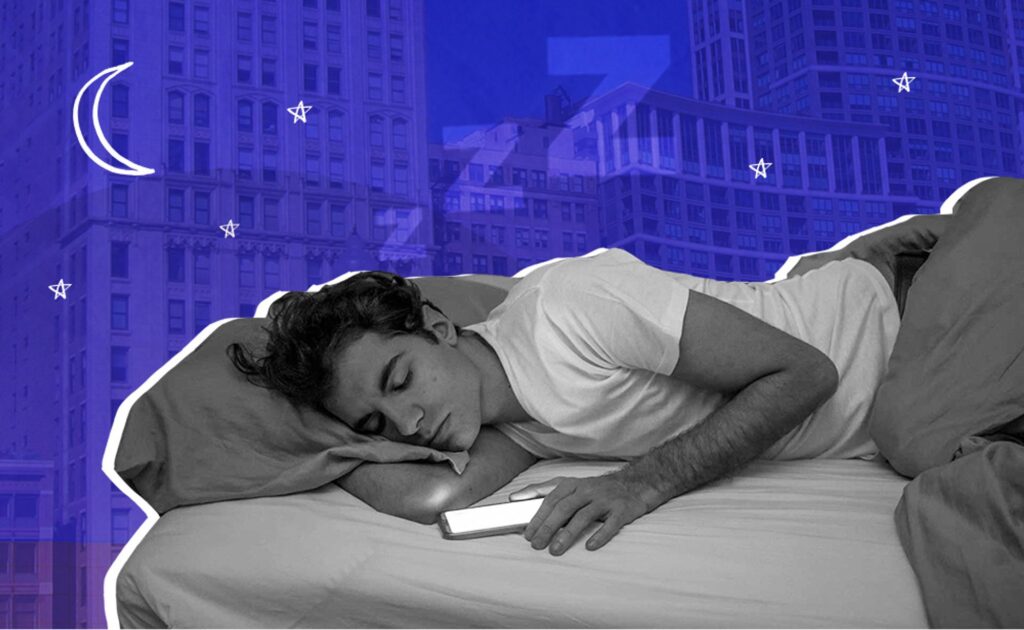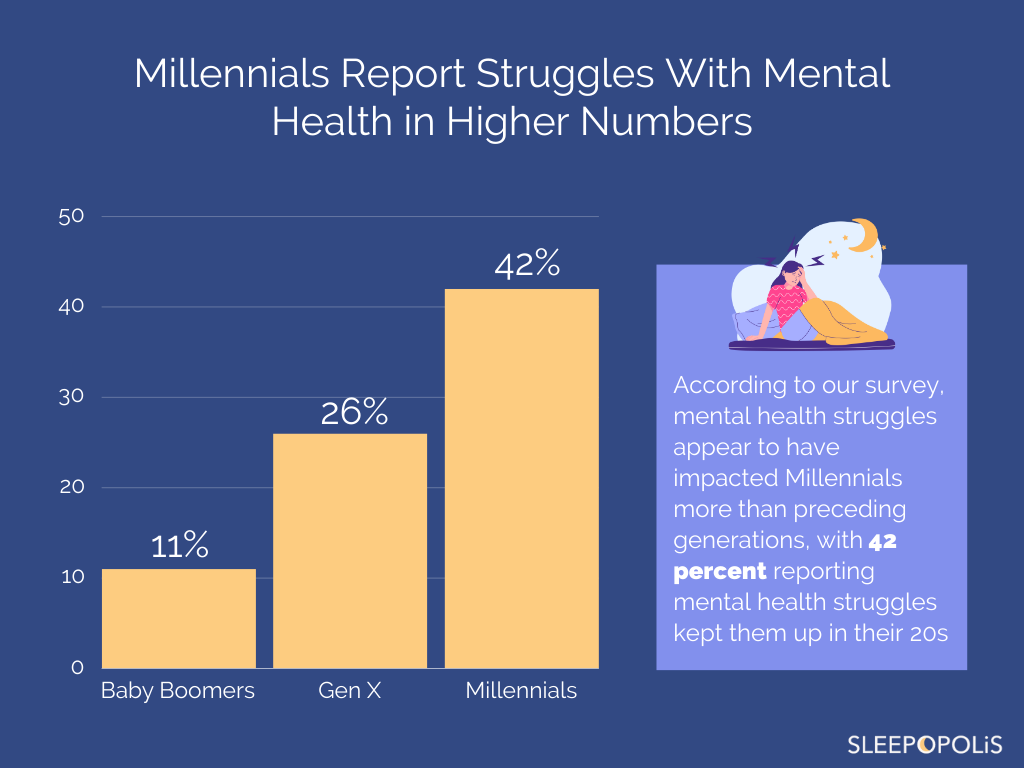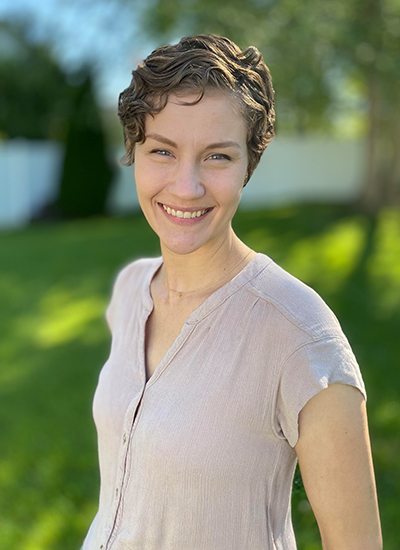Millennial Sleep Habits and Tips For Better Rest
- by Abby McCoy
- Updated: April 5, 2024
Table of Contents

Hey, millennials, how are you sleeping? Between an overload of electronic devices and high levels of stress, the millennial generation (those born between 1981 and 1996) potentially faces some pretty distinct sleep challenges. (1) Even though overall millennials are getting a little more sleep than some other generations did at their age, they also deal with obstacles unique to their age group. (2)
Like what, you ask? We asked that, too. In fact, Sleepopolis did a survey of nearly 1500 people to find out how millennial sleep compares to other generations. We’ll lay out all the facts below, as well as tips to help you upgrade your millennial sleep habits and get more restful slumber.
Note: The content on Sleepopolis is meant to be informative in nature, but it shouldn’t be taken as medical advice, and it shouldn’t take the place of medical advice and supervision from a trained professional. If you feel you may be suffering from any sleep disorder or medical condition, please see your healthcare provider immediately.
Long Story Short
- Millennials say it’s hard to fall asleep and stay asleep because of anxiety, stress, and the easy availability of social media on the electronic device at their bedside.
- Compared to gen X and the baby boomers, millennials may better understand the importance of sleep hygiene and how to implement it.
- To get better sleep, millennials can stay off the screens at bedtime, cut their caffeine and alcohol intake, and use deep breathing or meditation techniques to calm worries before sleep.
The Millennial Mentality on Health
Sleep intertwines closely with your health, which most millennials value big-time. As reported by Stanford Health, one survey found that millennials rate the importance of their health over any other aspect of their life aside from family. (3)
For example, compared to other generations, millennials care enough about their health to be picky about their doctors — one study found that well over half of millennials read online reviews before choosing a physician. (4)
When asked how healthy they feel, millennials tied with Gen Z as the age group with the highest self-reported health status. (5) Although millennials report an overall good health status, some studies have found that this generation is particularly vulnerable to mental health challenges, especially during the COVID-19 pandemic (6)
Stress may take a lot of blame for bad sleep, and rightfully so. (7) Millennials may have unique stressors in their lives, but they also have plenty of options for better sleep.
Millennial Sleep Habits and Challenges Through The Decades
How have millennial sleep habits changed over the decades? In all age groups, different stages of life bring new adventures, joys, and difficulties, and each one can affect your sleep.
Despite the previously-mentioned perceived healthy status, millennials — sometimes called the “Tired Generation” — report high levels of insomnia, poor diet, and low levels of exercise; all of which can hurt your sleep quality, says Carleara Weiss, PhD, a behavioral sleep medicine expert and sleep science advisor at Aeroflow Sleep.
But, how do these health and sleep issues break down through the decades?
Millennial Sleep: 20s and Early 30s
In their 20s, a lot of millennials may be forging through the beginning of their careers, working to establish their place in the world. Partially because of this career focus, many millennials are having babies later than their parents did. (8)
While this delay in child rearing may offer better sleep on one hand, work stress may take its place in the sleep-stealing category. One-third of millennials state they have the “Sunday Scaries,” which describes extra anxiety when falling asleep before beginning another week of work. (9)
Work itself isn’t the only stressor for millennials in this stage. “Millennials in their 20s and 30s experience a bumpy transition to adulthood: fewer jobs, cuts in salary, inflation, staggering student loan and credit card debt, and difficulty in saving money or buying a house, to name a few,” says Weiss.
That resulting stress can possibly steal sleep, but so can a lack of knowledge of the importance of sleep and sleep hygiene. “In my 20s I never thought much about sleep, had never tried sleep meditation, and didn’t consciously stick to a sleep schedule,” says Shân Osborn, a millennial entrepreneur.
“But in my later 20s and early 30s I started struggling a bit with falling and staying asleep (thanks, stress!), so I had to be way more intentional about sleep hygiene,” Osborn adds.
Sleep Hygiene, Defined
Sleep hygiene describes the habits around your bedtime and sleeping environment that can make or break your sleep: quantity and quality! (10) (11) Good sleep hygiene habits include going to bed at the same time each night, making your bedroom dark and cozy, and avoiding screens, caffeine, and alcohol before bedtime. (11)
Once millennials finish kick-starting their careers and start having kids, the new family additions can bring their own set of sleep challenges.
According to Sleepopolis’ 2024 survey of nearly 1500 adults, 24 percent of Gen X (born 1965-1980) and 26 percent of baby boomers (born 1946-1964) said raising children kept them up in their 20s, while just 13 percent of millennials said the same (Possibly because they’re having babies later than gen Xers and boomers did). (1)
Most anyone with kids knows they can keep you up and wake you up for a multitude of reasons. Babies sometimes need wee-hour feedings and may have an occasional all-night cry fest. Even when children get a bit older, nightmares, midnight bedwetting, and teens out past curfew may keep you up all hours.
We’re not sure why millennial parents are winning in the sleep department over gen X and the boomers, but their focus on health and sleep hygiene can’t hurt!
Millennial Sleep: 30s and 40s
Juggling the needs of children and aging parents, millennials in their late 30s and 40s are known as “the sandwich generation,” says Weiss.
In addition to all those responsibilities, they can also face pressure from an avalanche of available health and wellness information, which — while informative — may add a lot of pressure to meet near-impossible health standards, Weiss adds. “Combined, these emotional and financial challenges negatively impact sleep and mental health.”
In fact, the Sleepopolis survey found that 42 percent of millennials reported mental health struggles in their 20s, and almost 47 percent say their mental health keeps them up at night now. Not surprisingly, mental health problems, like anxiety and depression, can disrupt healthy sleep patterns. (2)

As millennials near midlife, health concerns can start popping up for some. Some people may have multiple medical diagnoses, less physical activity, and loss of muscle mass.3 (4) (5) However, Sleepopolis’ survey found millennials still worry less about their health problems than older generations.
Millennials vs. Gen X vs. Baby Boomers
Millennials may wonder how their sleep compares to gen X or baby boomers. (6) The answer is nuanced, says Weiss, because it depends on quite a few factors.
Millennials Get More Sleep
More sleep? Aren’t millennials known as the “tired generation?” Let’s explain. According to the U.S. Bureau of Labor Statistics, millennials sleep an average of 22 minutes more each night than gen X people did at their age (both 8+ hours), but this research didn’t measure the quality of that sleep. (7)
Did You Know?
Adults need 7 to 9 hours of quality sleep every night to live their best (and healthiest) life. (8)
Millennials Understand Sleep Health and Hygiene
In more good news, millennials generally know more about how sleep works. “I think we’re more aware of sleep hygiene and its importance,” says Osborn.
Weiss agrees, saying, “Millennials better understand the relationship between sleep and health. Recent studies report how this generation tends to prioritize sleep with earlier bedtimes and overall by seeking better sleep quality.”
Millennials Report More Mental Health Concerns
On the flipside, millennials appear to be dealing with more mental health problems than preceding generations. Sleepopolis’ survey found that 42 percent of millennials said mental health struggles kept them up in their 20s, much higher than the 26 percent of gen Xers and 11 percent of baby boomers.
Millennial survey responses also showed they were more than twice as likely as boomers to be kept up by mental health concerns overall.
Millennials Use Devices More
Though they aren’t the only generation living with portable screens, millennials have embraced their electronic devices with gusto. Sleepooplis’ survey found that 48 percent of millennials said that social media or technology kept them up at night in their 20s, while a much lower percentage of gen Xers and baby boomers said the same (12 and three percent, respectively).
Millennials Worry Less About Their Physical Health
Even though millennials are getting older, Sleepopolis’ survey found they still worry about their physical health a lot less than older generations. Only 15 percent of millennials reported health concerns kept them up at night, while 32 percent of gen Xers and 45 percent of baby boomers said they lost sleep over their health.
Sleep Tips for Millennials
If you’re one of those “tired millennials,” what can you do to help yourself sleep better? So glad you asked! We’ve got some tips and tricks tailored just for better millennial sleep.
Ditch the Phone at Bedtime
Our survey showed when millennials can’t sleep, they are more likely to scroll through social media than gen X or baby boomers, who tend to close their eyes until they feel sleepy.
In this case, the older folks have the right idea: the light from screens can confuse your circadian rhythm into thinking it’s time to get up and about. (9) Whether you’re in your 20s or 40s, if you stay away from your screens in bed, your body will likely have a better chance of dozing off.
What Is the Circadian Rhythm?
A 24-hour cycle Influenced by light and dark, your circadian rhythm helps your body figure out when to get sleepy and when to wake up. (9)
Chill Out on Caffeine and Alcohol
A fair amount of millennials consume a lot of caffeine and alcohol, two habits with a potentially negative impact on sleep, says Weiss, who recommends limiting caffeine to 200mg (1-2 cups of coffee) and cutting yourself off earlier in the day. (10)
For most adults, about half of the caffeine you consume leaves your system in about five hours, but everyone reacts differently to this stimulant, so you may need to push your cutoff time even earlier. (11)
Then there’s alcohol. Unlike caffeine, alcohol may make you sleepy initially, says Weiss, but it can wake you up throughout the night and disrupt your sleep cycles. (12) Experts recommend a limit of one drink or less a day for women and two or less for men. (13)
Your body may handle caffeine and alcohol differently in your 40s than in your 20s, but starting good habits now may help set you up for success later in life. (14) (15)
Quiet Your Mind
Do you relate to the “Sunday scaries?” Does your brain work overtime over work anxiety, which can come for you in your 20s, 30s, or 40s? Osborn says she lost a lot of sleep to stress, but now does breathing exercises before bedtime to help her relax. She also uses NSDR (non-sleep deep rest) meditation to help her get to sleep initially, or if she wakes in the middle of the night.
If You Have Kids…
It’s tough to offer one-size-fits-all advice for sleep-deprived parents — this topic has filled many a shelf at your local bookstore. Whatever parenting responsibilities keep you up, remember they are usually temporary.
Work with your kiddos to establish good sleep habits and excellent sleep hygiene even at a young age. They probably won’t get it overnight, but you’ll be setting the stage for better sleep for years to come. Try to take turns with a partner or leaning on your support system to catch up on your sleep debt where you can, and hang in there!
Keep an Eye on Your Health
If you’re starting to worry about your health or if symptoms keep you up at night, you can address them head-on. Let your healthcare provider know about any new symptoms, and point out the ones that are stealing your sleep. They may be able to help you identify the cause and find you some solutions to get your sleep back on track.
FAQs
What generation is the most sleep deprived?
Recent surveys suggest that millennials have more sleep disturbances (mostly associated with financial stress) compared to gen X and baby boomers,” says Dr. Weiss.
What is the average bedtime for millennials?
There’s no hard and fast bedtime for this group — the average bedtime and how much sleep you need varies from person to person depending on various factors like where you work, what time you have to get up, and your overall health. (16)
The Last Word From Sleepopolis
Millennials deal with sleep obstacles that no previous generation has experienced. Right now, this generation is in the middle of a busy time of life, and likely getting busier. You know you need to sleep, but it can be difficult to overcome your snoozing obstacles. Know you’re not alone in this — our survey shows many other millennials are in the same boat! Follow our tips, talk to your healthcare provider, and enjoy some better sleep ahead.
Sources
- How Millennials Approach Family Life | Pew Research Center. Accessed March 6, 2024. https://www.pewresearch.org/social-trends/2020/05/27/as-millennials-near-40-theyre-approaching-family-life-differently-than-previous-generations/
- Scott AJ, Webb TL, Martyn-St James M, Rowse G, Weich S. Improving sleep quality leads to better mental health: A meta-analysis of randomised controlled trials. Sleep Medicine Reviews. 2021;60:101556. doi:10.1016/j.smrv.2021.101556
- Muscle tissue changes with aging – PMC. Accessed March 6, 2024. https://www.ncbi.nlm.nih.gov/pmc/articles/PMC2804956/
- Aging changes in the bones – muscles – joints: MedlinePlus Medical Encyclopedia. Accessed March 11, 2024. https://medlineplus.gov/ency/article/004015.htm
- Aubert CE, Kabeto M, Kumar N, Wei MY. Multimorbidity and long-term disability and physical functioning decline in middle-aged and older Americans: an observational study. BMC Geriatrics. 2022;22(1):910. doi:10.1186/s12877-022-03548-9
- Where Millennials end and Generation Z begins | Pew Research Center. Accessed March 4, 2024. https://www.pewresearch.org/short-reads/2019/01/17/where-millennials-end-and-generation-z-begins/
- Time use of millennials and Generation X: differences across time.
- How Sleep Works – How Much Sleep Is Enough? | NHLBI, NIH. Accessed October 21, 2023. https://www.nhlbi.nih.gov/health/sleep/how-much-sleep
- Circadian Rhythms. Accessed January 6, 2024. https://www.nigms.nih.gov/education/fact-sheets/Pages/circadian-rhythms.aspx
- Tips for Better Sleep | CDC. Accessed November 4, 2023. https://www.cdc.gov/sleep/about_sleep/sleep_hygiene.html
- Caffeine – StatPearls – NCBI Bookshelf. Accessed November 4, 2023. https://www.ncbi.nlm.nih.gov/books/NBK519490/
- Britton A, Fat LN, Neligan A. The association between alcohol consumption and sleep disorders among older people in the general population. Sci Rep. 2020;10(1):5275. doi:10.1038/s41598-020-62227-0
- Facts about moderate drinking | CDC. Accessed March 6, 2024. https://www.cdc.gov/alcohol/fact-sheets/moderate-drinking.htm
- Facts About Aging and Alcohol | National Institute on Aging. Accessed March 6, 2024. https://www.nia.nih.gov/health/alcohol-misuse-or-alcohol-use-disorder/facts-about-aging-and-alcohol
- Jee HJ, Lee SG, Bormate KJ, Jung YS. Effect of Caffeine Consumption on the Risk for Neurological and Psychiatric Disorders: Sex Differences in Human. Nutrients. 2020;12(10):3080. doi:10.3390/nu12103080
- How Much Sleep Do I Need? | CDC. Accessed November 3, 2023. https://www.cdc.gov/sleep/about_sleep/how_much_sleep.html
- Wolfe R. The Hottest New Bedtime for 20-Somethings Is 9 p.m. The Wall Street Journal. https://www.wsj.com/health/wellness/early-sleep-bedtime-6ecd1d67. Published February 1, 2024.
- Hublin C, Haasio L, Kaprio J. Changes in self-reported sleep duration with age – a 36-year longitudinal study of Finnish adults. BMC Public Health. 2020;20(1):1373. doi:10.1186/s12889-020-09376-z
- Mamun AA, Scott J, Najman JM, Williams GM, Alati R, Fatima Y. Generational changes in young adults’ sleep duration: a prospective analysis of mother–offspring dyads. Sleep Health. 2020;6(2):240-245. doi:10.1016/j.sleh.2019.12.007
Carleara Weiss. Personal Interview. March 4, 2024.
Shân Osborn. Personal Interview. March 3, 2024.
